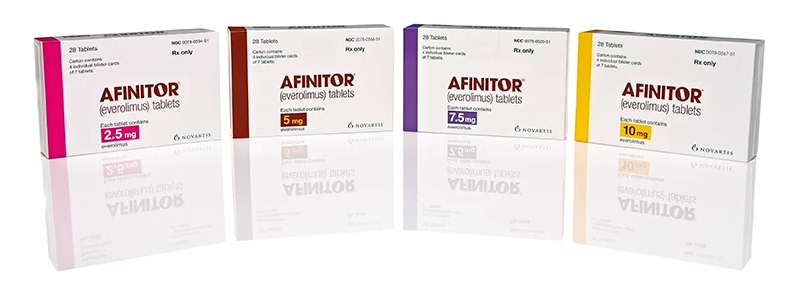Afinitor (everolimus) vs Krazati (adagrasib)
Afinitor (everolimus) vs Krazati (adagrasib)
Afinitor (everolimus) is an mTOR inhibitor used to treat various types of cancer, such as advanced renal cell carcinoma, certain breast cancers, and neuroendocrine tumors, as well as to prevent organ rejection in transplant patients. Krazati (adagrasib) is a KRAS G12C inhibitor specifically designed to target and treat non-small cell lung cancer (NSCLC) with the KRAS G12C mutation. When deciding between Afinitor and Krazati, it is crucial to consider the specific type of cancer and its genetic makeup, as Krazati is tailored for NSCLC with a particular mutation, whereas Afinitor has a broader application in oncology but may not be suitable for KRAS G12C-mutated cancers.
Difference between Afinitor and Krazati
| Metric | Afinitor (everolimus) | Krazati (adagrasib) |
|---|---|---|
| Generic name | Everolimus | Adagrasib |
| Indications | Cancer (advanced hormone receptor-positive, HER2-negative breast cancer, advanced neuroendocrine tumors, advanced kidney cancer, subependymal giant cell astrocytoma, renal angiomyolipoma with tuberous sclerosis complex) | Non-small cell lung cancer (NSCLC) with KRAS G12C mutation |
| Mechanism of action | mTOR inhibitor | KRAS G12C inhibitor |
| Brand names | Afinitor, Afinitor Disperz, Zortress | Krazati |
| Administrative route | Oral | Oral |
| Side effects | Mouth ulcers, infections, rash, fatigue, diarrhea, edema, abdominal pain, nausea, fever, pneumonitis | Nausea, vomiting, diarrhea, fatigue, increased liver enzymes, anemia, edema, musculoskeletal pain |
| Contraindications | Hypersensitivity to everolimus or other rapamycin derivatives | Hypersensitivity to adagrasib or any of the excipients |
| Drug class | Antineoplastic agent, mTOR kinase inhibitor | Antineoplastic agent, KRAS G12C inhibitor |
| Manufacturer | Novartis | Mirati Therapeutics |
Efficacy
Afinitor (Everolimus) Efficacy in Lung Cancer
Afinitor (everolimus) is a medication that has shown efficacy in the treatment of various types of cancer, including lung cancer. Specifically, everolimus is a mammalian target of rapamycin (mTOR) inhibitor, which works by interfering with the growth of cancer cells and can slow their spread in the body. In the context of lung cancer, everolimus has been studied primarily in patients with advanced non-small cell lung cancer (NSCLC) after the failure of other treatments. Clinical trials have demonstrated that everolimus can provide a modest benefit in terms of progression-free survival in this patient population. However, it is not typically a first-line treatment option for lung cancer.
Krazati (Adagrasib) Efficacy in Lung Cancer
Krazati (adagrasib) is a newer medication that targets a specific genetic mutation known as KRAS G12C, which can be present in non-small cell lung cancer (NSCLC). This mutation has been historically difficult to target with existing therapies. Adagrasib is designed to bind irreversibly to the mutated KRAS protein, thereby inhibiting its function and the downstream signaling pathways that promote cancer cell growth and survival. Clinical trials have shown that adagrasib has significant efficacy in patients with NSCLC harboring the KRAS G12C mutation, offering a promising new treatment avenue for this challenging subset of lung cancer.
It is important to note that the efficacy of both Afinitor and Krazati is highly dependent on the specific characteristics of the lung cancer and the patient's overall health status. Afinitor may be considered in certain cases of advanced NSCLC where standard therapies have failed, while Krazati is specifically indicated for patients with the KRAS G12C mutation. As with all cancer treatments, the decision to use these medications should be based on a thorough discussion between the patient and their healthcare provider, considering the potential benefits and risks.
Overall, while Afinitor offers an option for certain patients with advanced NSCLC, Krazati represents a targeted approach for those with the specific KRAS G12C mutation. The development of Krazati is particularly noteworthy as it addresses a previously unmet need in the treatment of KRAS-mutated NSCLC, which is a common and aggressive form of lung cancer. Ongoing research and clinical trials continue to refine the understanding of how best to utilize these medications in the management of lung cancer.
Regulatory Agency Approvals
Afinitor
-
European Medical Agency (EMA), European Union

-
Food and Drug Administration (FDA), USA

-
Health Canada

-
Pharmaceuticals and Medical Devices Agency (PMDA), Japan

-
Therapeutic Goods Administration (TGA), Australia

Krazati
-
Food and Drug Administration (FDA), USA

Access Afinitor or Krazati today
If Afinitor or Krazati are not approved or available in your country (e.g. due to supply issues), you can access them via Everyone.org.
How it works

Make an enquiry
Choose the medicine you want to buy, answer a couple of questions, and upload your prescription to speed things up. We’ll get back to you within 24 hours.


Make an enquiry
Choose the medicine you want to buy, answer a couple of questions, and upload your prescription to speed things up. We’ll get back to you within 24 hours.


Breeze through the paperwork
We'll guide you through the required documents for importing unapproved medicine, ensuring you have all the necessary information.


Get a personalized quote
We’ll prepare a quote for you, including medicine costs and any shipping, administrative, or import fees that may apply.


Receive your medicine
Accept the quote and we’ll handle the rest - sourcing and safely delivering your medicine.

Some text on this page has been automatically generated. Speak to your physician before you start a new treatment or medication.
Let's talk
If you have any questions, call us or send us a message through WhatsApp or email:
Contact us




